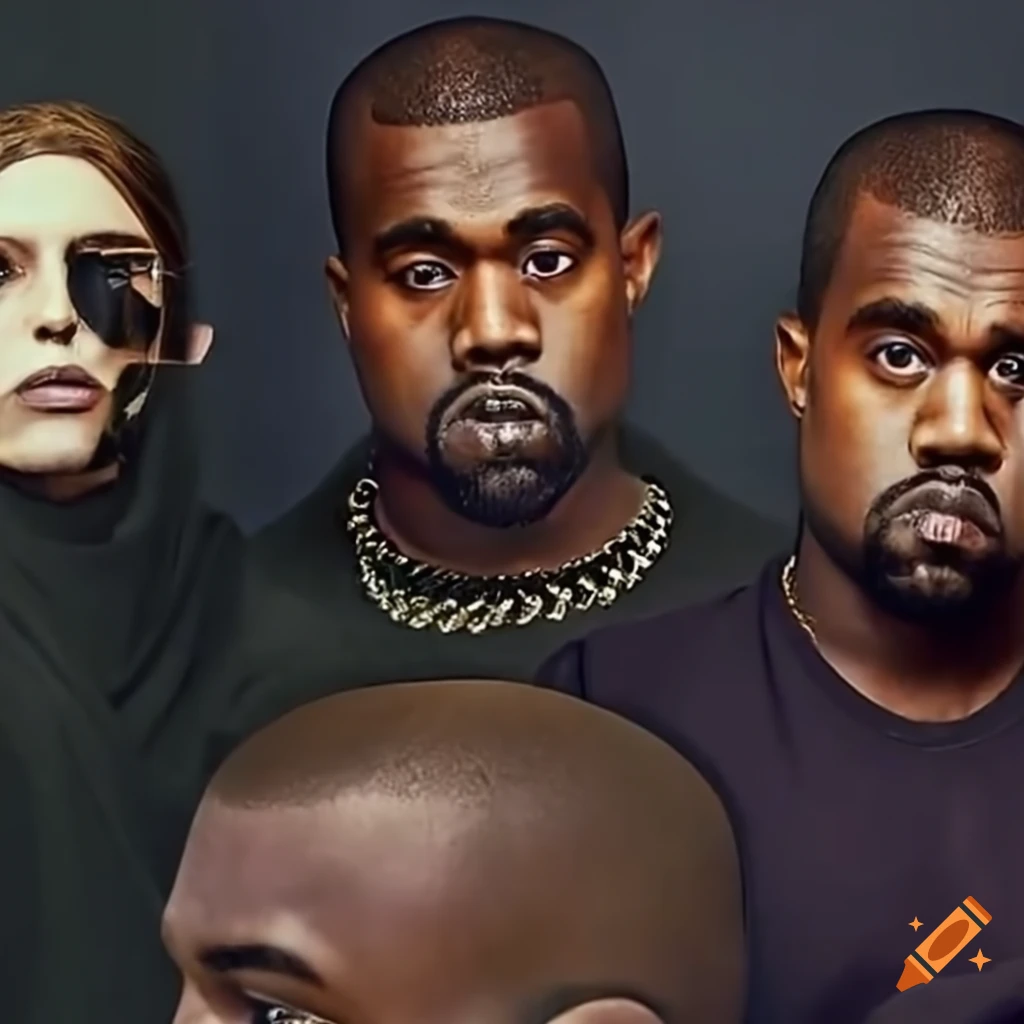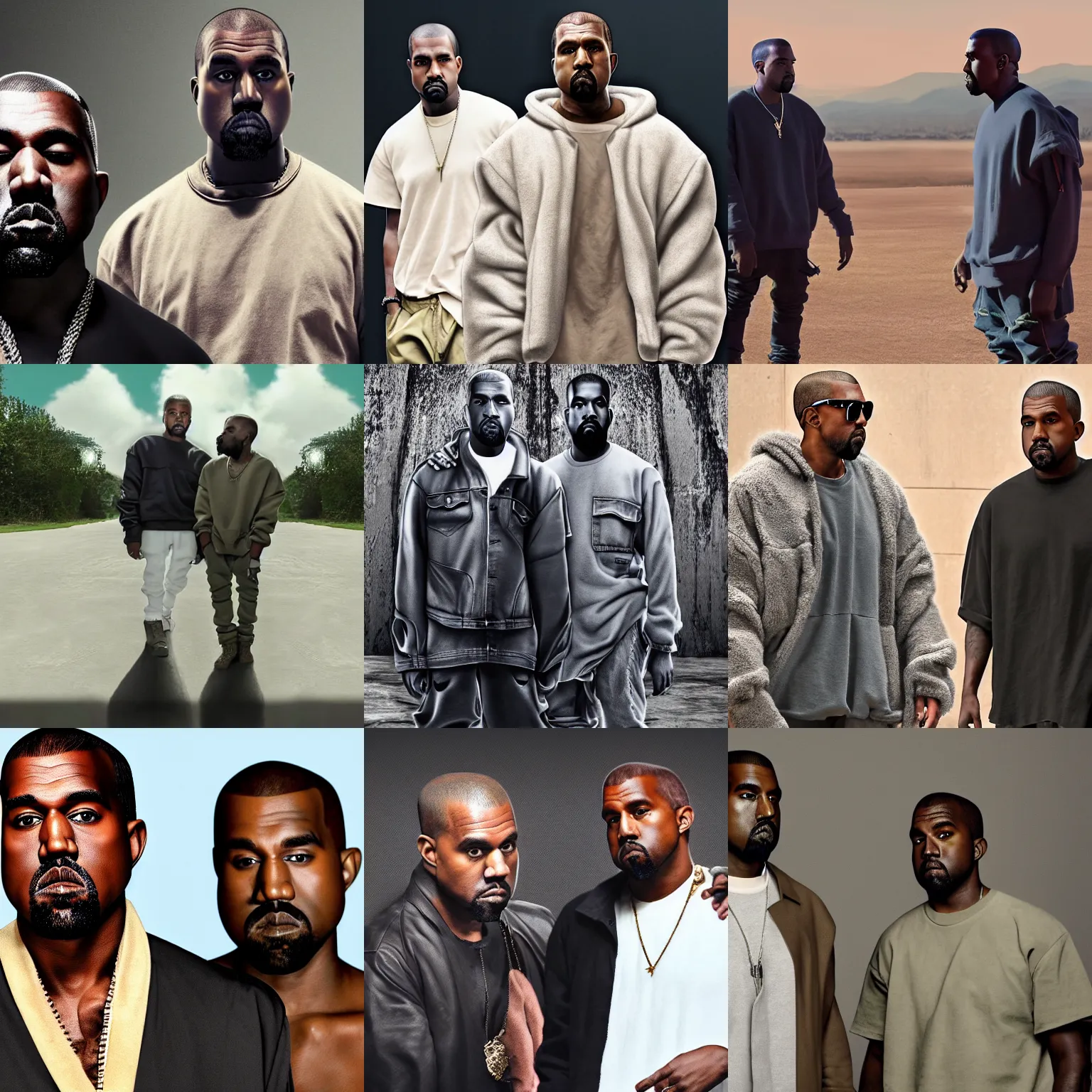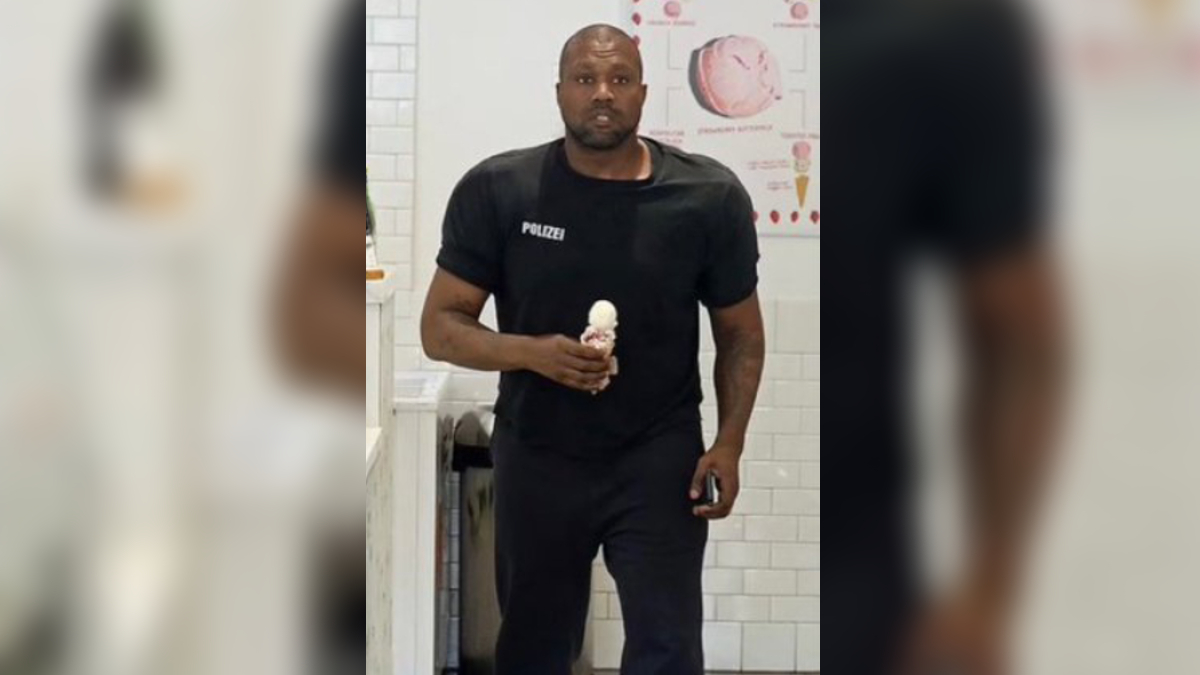Is Kanye West A Clone? Exploring The Conspiracy Theory
Is the man we know as Kanye West truly who he seems? The persistent and increasingly widespread "Kanye West clone conspiracy" suggests that the individual currently living the life of the globally recognized artist might not be the original, but rather, a carefully crafted replica.
The genesis of this intriguing theory can be traced back to 2015, when the satirical news outlet Waterford Whispers News published a story with the provocative headline, "Kanye West Announces Plans to Clone Himself." This sparked a series of discussions and speculations that have since gained significant traction across various online platforms.
The core of the theory centers around the idea that the rapper, now 47 years old, has been replaced by a clone, an almost identical doppelganger who has seamlessly stepped into his public and private life. This alleged substitution is fueled by observations of perceived changes in West's appearance, behavior, and public statements. The whispers of this conspiracy have grown louder in recent months, amplified by a constant stream of rumors and social media buzz.
- Brian Glenn News Age Marjorie Taylor Greene More
- Erin Siena Jobs Unveiling Steve Jobs Daughter Whats She Up To
| Attribute | Details |
|---|---|
| Full Name | Kanye Omari West |
| Born | June 8, 1977 (age 47) Atlanta, Georgia, U.S. |
| Nationality | American |
| Known For | Rapper, Singer, Songwriter, Record Producer, Fashion Designer, Entrepreneur |
| Marriages | Kim Kardashian (2014-2022), Bianca Censori (2023-present) |
| Children | North West, Saint West, Chicago West, Psalm West |
| Associated Acts | Jay-Z, Common, Kid Cudi, Pusha T, Rihanna, Drake |
| Years Active | 1996present |
| Notable Albums | The College Dropout, Late Registration, Graduation, 808s & Heartbreak, My Beautiful Dark Twisted Fantasy, Yeezus, The Life of Pablo, Ye, Jesus Is King, Donda |
| Official Website (Reference) | kanyewest.com |
One of the most vocal proponents of this theory is Kristin Cavallari, known for her appearances on "Laguna Beach." On a recent episode of her podcast, "Let's Be Honest," she openly declared her belief that Kanye West, along with Britney Spears, has been replaced by clones. Cavallari self-identifies as a "biggest conspiracy theorist," setting the stage for a deep dive into the evidence (or lack thereof) that has fueled the Kanye West clone theory.
The conjecture about a cloned Kanye West, though, didn't originate on social media platforms like TikTok. The seeds were sown much earlier. The belief that the current public figure is an imposter, an imitation of the real West, has been circulating for years. This adds layers of complexity to the narrative, blurring the lines between speculation and perceived reality.
The "Kanye West clone" theory is more than just a passing fad. It is a testament to the widespread reach and influence of online communities. While many dismiss the idea as pure fiction, the arguments presented by its proponents are sometimes compelling. They point to a series of anomalies, suggesting the existence of a manufactured double.
- Maz Jobrani Preetha Jobrani A Look At Their Life Together
- Laury Saavedra Anuel Aa Relationship Baby News What You Need To Know
The claim of a clone is predicated on the idea of an extensive and well-funded operation. The idea of a body double, a person who bears enough physical resemblance to the original to pass in public, is a common one in the world of celebrity. Clones, by contrast, are more commonly a staple of science fiction.
The "clone" theory suggests a deeper conspiracy, a coordinated effort to control or manipulate the public perception of the artist. This has led to a heightened sense of distrust and suspicion among some fans.
The alleged changes in Kanye Wests public persona are a central point of the theory. His outspoken rants, unusual fashion choices, and controversial public statements have fueled the suspicion that the man in the spotlight is not the same individual the world has come to know.
Critics will likely dismiss the allegations as the product of misinformation and speculation, a sign of the times in an era defined by the ease of access and the proliferation of online content.
Whether or not the "Kanye West clone" theory holds water remains to be seen. Nevertheless, it is a symptom of the broader challenges facing modern society.
Detractors often emphasize the lack of concrete evidence, highlighting the unsubstantiated nature of the claims. They will point to the absence of any scientific proof or credible eyewitness accounts that support the presence of a clone. Instead, they attribute the theories to wishful thinking, speculation, and confirmation bias, where individuals are inclined to interpret ambiguous information in a way that confirms their pre-existing beliefs.
The rumors are fueled by a cycle of conjecture. The media often plays a crucial role in the propagation of conspiracy theories. Articles, blog posts, and videos analyzing Wests behavior and appearance have become a staple of many online publications. This constant attention serves to validate and amplify the claims, creating a feedback loop that reinforces the beliefs of those who already subscribe to the theory.
The "Kanye West clone" theory also touches upon a deeper fear: the loss of authenticity in the age of digital media and artificial intelligence. The potential for deepfakes and AI-generated content to blur the lines between reality and simulation adds another layer of complexity to the story.
One of the crucial points is the alleged changes in the artists physical appearance over the years. Proponents of the clone theory often point to alterations in Wests features, such as facial structure, skin tone, and even tattoos, to support their claims.
The speed at which such rumors circulate is a testament to the power of social media. A single video or post can quickly gain a massive audience, fueling discussions, and potentially influencing public perception. The "Kanye West clone" theory gained considerable traction on TikTok and other platforms, quickly becoming a viral sensation. This demonstrates the viral potential of misinformation and the impact it can have on popular culture.
The rise of AI-generated content has further complicated the situation. Advances in AI technology have made it easier to create realistic images and videos that depict individuals doing and saying things they never did. This makes it harder to distinguish between genuine content and fabricated media, fueling skepticism and mistrust.
The theory draws on the use of AI to mimic the voice of West. AI voice generators are able to produce realistic imitations of a persons voice, allowing users to create fake audio content, further muddying the waters of truth and fiction.
There are various opinions, but it is hard to dismiss the popularity of the theory. From the perspective of those who propagate the theory, the real question isn't about the "goodness" of the artist, but rather, whether the individual currently in the public eye is genuine.
The narrative is not limited to a single source. Many different individuals, platforms, and media outlets have contributed to the discussion. This ensures the theorys continued growth and evolution over time.
The "Kanye West clone" theory underscores the impact of celebrity culture and the intense scrutiny public figures face. The theory is also a symptom of the pervasive distrust of established institutions and authorities, which is a hallmark of the modern age.
The story can be considered a reflection of the times. It is a complex issue with a number of potential factors that make it difficult to resolve. Some say the world is a crazy place, where the lines between fact and fiction are often blurred. The theory serves as a case study in the dynamics of online rumor-mongering, highlighting the power of misinformation, social media, and the ever-present human fascination with conspiracies.

Digital art of kanye west clone coming out of a lab on Craiyon

kanye west meets his clone kanye east, highly Stable Diffusion

Was Kanye West Cloned? The Roaring Times